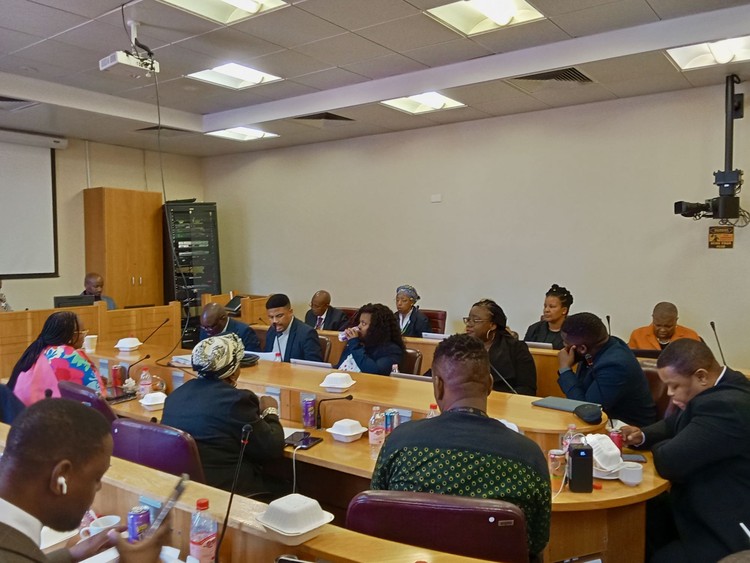
5 October 2023
The National Student Financial Aid Scheme briefing Parliament’s portfolio committee for higher education in September. Archive photo: Qaqamba Falithenjwa
On Wednesday, the National Student Financial Aid Scheme (NSFAS) told Parliament it has a turnaround plan to fix its failures, but Parliament’s portfolio committee for higher education was unconvinced.
Last month, NSFAS briefed Parliament on its new direct payment system and other issues, and it faced sharp criticism from the committee for its continued failures.
NSFAS was given a two-week deadline to present a plan to fix itself, but at the next meeting NSFAS and higher education Minister Blade Nzimande snubbed Parliament.
At a virtual meeting on Wednesday, Nzimande said “detractors want to attack NSFAS left, right and centre”, because it is a government scheme.
He said although the funding scheme is experiencing challenges, it is incorrect to project it as if it is lying on its stomach.
Nzimande said he met the NSFAS board in August. “Thus far I have confidence in the board because whenever I have raised issues with them, they were able to deal with the challenges,” he said.
NSFAS acting CEO Masile Ramorwesi said following the last portfolio committee meeting, the executive board met with the student leadership to discuss how challenges with direct payments could be addressed. He said they devised a seven-step approach of which the first two steps had already been completed.
Firstly, to form two teams who will report directly to the acting CEO about students’ challenges. The teams will then visit ten universities and 29 TVET colleges over ten days to observe challenges on the ground. They will report to the acting CEO in written form, and he will then develop a response strategy.
From 9 October, Ramorwesi will report to the NSFAS board, which will then develop its own report for the minister.
Ramorwesi listed various challenges: slow bank card distribution, cyber-attacks, non-responsiveness in query handling, partners having limited capacity, registration template errors, and excessive bank charges.
He said distributing bank cards to students on campus was delayed “as some student leaders had disrupted the distribution at some universities by vandalising the cards and threatening the teams that were on the ground and chasing them out of the universities”.
He said it was a concern that at the end of September, there were about 20,000 appeals (in which students appeal against having been turned down for funding) awaiting documentation.
He said there were about 16,000 appeals still awaiting academic eligibility criteria.
“We previously indicated that we communicated with the institutions to submit the academic results of their students,” he said. They aim to resolve these by 30 October.
But about 60,000 appeals have been finalised.
Thami Mazibuko, project manager at Coinvest, said the company is responsible for disbursing funds to over 268,000 students at 13 TVET colleges and seven universities.
In terms of paying allowances, Mazibuko said they have “paid everything”.
“We never paid less or more. We paid every cent according to the specifications which came from NSFAS.”
“If a student says they were underpaid, that is a process that first goes through NSFAS and then to us. All that we’ll get is to pay x amount to a student and then we do that,” he said.
Saud Ally, group CEO for eZaga, said the company is responsible for disbursing funds to over 143,000 students at six universities and 11 TVET colleges.
Ally said once they receive a beneficiary file from NSFAS, they do a “Know Your Customer (KYC)” validation which “normally goes through Home Affairs … and to validate if the student hasn’t committed fraud previously”.
Neal MacIntyre, of Norraco, said the company disbursed funds to over 131,000 students at 13 TVET colleges and seven universities. It has paid out R1.3-billion in the past year.
Ryan Passmore, project executive at Tenet Technology, which is responsible for allocating allowances to 225,000 NSFAS beneficiaries at 13 TVET colleges and six universities, said they have already disbursed R1.4-billion to NSFAS students.
Tenet was busy loading and authenticating the student beneficiaries on its banking platform.
But Chair of the committee Nompendulu Mkhatshwa (ANC) said NSFAS and the service providers’ presentations lacked critical information.
“You’re telling us how many students you’re supposed to be disbursing to, how many have been KYC’d, and how many have cards … but we want to know how many you have paid each month,” said Mkhatshwa.
Portfolio committee member Walter Letsie (ANC) said it is still unclear whether the disbursement problems from July had been resolved. “There are still students who did not get their funds, and we still don’t know why. Whether it’s NSFAS not paying the providers enough, or whether it’s the service provider’s systems. We still don’t know.”
Karabo Khakhau (DA) said there was a lack of clarity on how NSFAS was going to capacitate its call centres and by when. “Solutions need a number and a deadline,” she said.
Mkhatshwa concluded the meeting by saying that most of the committee’s concerns were data related. “We need to know why students have not received their allowances, at which institutions, where have we sent allowances to, what are the shortfalls.”
She asked the service providers to submit the information within seven working days.